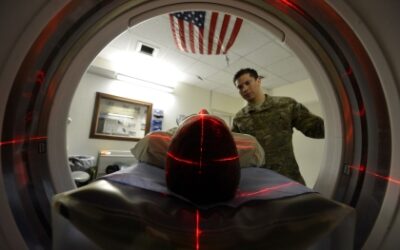Pam and I have had our share of hard knocks this summer. From the ongoing personal and financial trauma of our sailboat/home lightning strike to our latest bout of COVID-19, the hits just seem to keep on coming. I also (finally) finished a fictional novel, but was utterly unprepared for the hell that is getting published.
Traumatic Brain Injury Linked to Much Higher Risk of Arrhythmia in Veterans
Traumatic brain injury, especially involving penetration, significantly increased the risk for atrial fibrillation or atrial flutter in U.S. military servicemembers and veterans, according to a new study.
VA $1 Billion Behind in Collecting Insurance, Co-Pays With Software Tool Offline
VA is close to restarting a software tool integral to allowing the department to track its billing of community providers. The Program Integrity Tool (PIT) has been offline since flaws in the system were discovered in February 2023.
Equal, Equitable and Excellent: A Call to Action for Indigenous Care
Native Americans serve in the military at the highest rates per capita of any racial or ethnic group. According to the Office of Health Equity, analysis of fiscal year 2016 to 2019 data revealed that American Indian veterans, less than half were enrolled in VA care.
Military Service, Race Make Black Veterans More Likely To Have Metastatic Prostate Cancer
The issue of metastasis in prostate cancer can’t really be discussed without a startling fact: Black men are disproportionately affected by prostate cancer (PCa), with earlier presentation, more aggressive disease, and higher mortality rates vs. white men.
VA Continues Research on Radioligands to Optimize Treatment of mCRPC
The promising outcomes from studies of the radioligand lutetium Lu 177 vipivotide tetraxetan (Lu177-PSMA) as a second-line therapy for metastatic castration-resistant prostate cancer (mCRPC) has encouraged researchers to explore its effectiveness when moved earlier in treatment and in combination with other cancer therapies.
Veterans’ Higher Risk of Metastatic Prostate Cancer Drives Continuous Treatment Updates at VA
The U.S. government and the VA increasingly recognize the increased risk of prostate cancer faced by veterans and its relationship to service in areas of conflict.
Consensus Statement, Real-World Experience Guide Lu177-PSMA Use
Since receiving Food and Drug Administration (FDA) approval in 2022 for use in metastatic castration-resistant prostate cancer (mCRPC), adoption of lutetium Lu 177 vipivotide tetraxetan (Lu177-PSMA) has grown rapidly.
Treatment for mCRPC Undergoes Constant Reassessment, Improvement at VA
As the options for treatment of metastatic castration-resistant prostate cancer (mCRPC) continues to increase, determining the best order for sequencing them becomes more complicated.
Review Finds Little Evidence That Massage Therapy Relieves Painful Health Conditions
For individuals seeking relief from painful health conditions, there’s low certainty of evidence that massage therapy will ease their pain, according to a recent review article.
Nearly $15 Billion Budget Shortfall Must Be Addressed This Month, VA Officials Said
Congress recessed for August without passing legislation to close the nearly $15 billion budget shortfall VA is facing for this year and next. The shortfall, which came to light in July, includes $2.88 billion for the remainder of FY2024 and $12 billion for FY2025.
New Algorithm Developed for Urinary Retention Evaluation, Catheterization
A new algorithm could improve care for adult inpatients who need to be evaluated for urinary retention and possible catheterization, according to a recent study.
Does ‘Underserved’ Designation Demoralize Staff at VA Facilities?
For the past several years, VA has been identifying the most underserved facilities in its system and requiring them to create action plans to improve care to their veterans.
Unraveling the Mystery of Long COVID: VA Steps Up for Nation in Crisis
By March 2020, the SARS-COV-2 virus had reached every inhabited continent on the globe, with devastating impact. In response, the U.S. and many other countries entered lockdowns to slow the spread and reduce deaths from the virus.
Innovative Pain Self-Management Program Improved Pain, Depressive Symptoms in HIV Patients
For almost three decades, antiretroviral therapy (ART) has enabled people with HIV to have nearly normal life expectancies. But as many as 85% of them experience chronic pain, due in part to common medical comorbidities and the side effects of life-saving treatments.
Microvascular Complications of Type 2 Diabetes Drop When PTSD Resolves in Veterans
Post-traumatic stress disorder (PTSD) has a range of adverse effects in veterans, and about 7% are affected at some point in their lifetimes. A recent study puts a spotlight on an unexpected co-morbidity—worsening Type 2 diabetes (T2D) outcomes.
Alternative Prostate Cancer Screening Guidelines for U.S. Black Men
In the United States, Black men are at highest risk for being diagnosed with and dying from prostate cancer.
Review Authors Urge More Genetic Testing of BRCA for Male Cancer Patients
Even though half of all carriers of inherited cancer-predisposing variants in BRCA1 and BRCA2 are male, the implications for their health tend to be under-recognized compared to females, according to a new study.
Another Reason to Reduce PPI Use? Usage Linked to Susceptibility for Respiratory Infections
One of the most commonly used medication classes worldwide, proton pump inhibitors (PPIs) are effective for treating acid-related stomach disorders, such as ulcers, heartburn or acid reflux.
Prescription Medications Affect Survival Rates in Metastatic Prostate Cancer
How do prescription medications affect overall survival in metastatic hormone-sensitive prostate cancer?
VA EHR Rollout at Lovell Federal Healthcare Center Better Than Previous Sites, But Legislators Say Some Issues Persist
About six months ago, the James A. Lovell Federal Healthcare Center became the sixth VA site to switch to the Oracle-Cerner electronic health record (EHR).
Hepatocellular Carcinoma Screening Associated With Improved Survival in Patients Cured of HCV Infection
Hepatitis C virus (HCV) is the most common blood-borne pathogen in the United States, with HCV-related cirrhosis being the leading cause of primary liver cancer, or hepatocellular carcinoma (HCC).
Study: Propofol Use Should Be Minimized in Children With ALL
A study involving military researchers has raised concerns about the use of certain types of anesthesia in children with acute lymphocytic leukemia (ALL)
Circumstances Linked to Bleeding Risk With Chronic Liver Disease Diagnosis
A recent study looked at risk factors for non-variceal bleeding within the first year after diagnosis of chronic liver disease in veterans.
Multiple Myeloma Patients Have Longer Survival With Military Healthcare
MHS beneficiaries with multiple myeloma (MM) had improved overall survival compared to MM patients from the U.S. general population, according to a new report.
Gastrointestinal Symptoms Frequently Diagnosed in Deployed Gulf War Veterans
Deployed Gulf War veterans frequently developed several gastrointestinal symptoms, including irritable bowel syndrome, dyspepsia, diarrhea, bloating and constipation, and those often persisted long after returning home, according to a new study.
Use of Non-therapeutic Laparotomy Decreased in Recent Wars but Remain Essential Battlefield Trauma-Care Tool
As combat casualty care improved over time during the wars in Iraq and Afghanistan, the use of nontherapeutic laparotomy (NTL) decreased.
Study: Eating Processed, Red Meat Raises the Risk of Type 2 Diabetes
Consuming meat, especially processed and red meat, is a risk factor for the development of type 2 diabetes, according to a new study involving VA researchers.
Misdiagnosis of Community-Acquired Pneumonia Occurs More Than Half the Time at VA Hospitals
Pneumonia diagnoses change more often than not at VA hospitals, either because a veteran initially thought to have the infection is diagnosed with something else or because the community-acquired pneumonia diagnosis was missed when the patient entered the hospital.
Persian Gulf War Service Linked to High Rates of Myeloproliferative Neoplasms
A study of almost a half-million veterans has found for the first time a link between environmental exposures during military service and the development of myeloproliferative neoplasms (MPNs).












